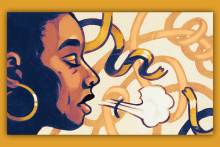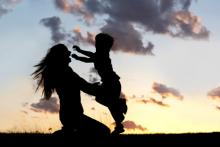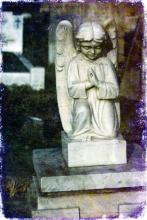prodigal son

WE LIVE IN a ruthless world that exhausts our bodies and souls. We are constantly bombarded with messages, reels, texts, and images that set our moral compasses spinning. As seekers of a more just world, the pressure to respond overwhelms us as we have never seen before. And so, I ask: When was the last time you intentionally cared for your body and soul?
The guilt one feels when one rests is a manifestation of how oppressive systems have convinced us that to rest and breathe is contrary to the necessities and requirements of a functioning society. And yet, we must breathe because the fight for a more just world is not only outside of us. It is also in us.
This month’s lectionary readings invite us to first breathe. Then, as we breathe, we are invited to become peacemakers, witnesses of righteousness, justice-seekers, and reconciling siblings. All these invitations are heavy. They are easier said than done. Many of us have probably responded to such invitations a long time ago. Our wounds and scars tell stories of what happens when we say yes.
Scars are marks of healing from yesterday’s struggles. To breathe is to reconnect the tissues of interdependence and mutuality that sustain our work for a more just world. To breathe does not neglect the issues at hand; rather, it helps us remember that we have divine witnesses who are sustaining us here and now.

OFTEN, WITH MEDITATION, I’m reminded of many people’s reaction to poetry. “I don’t get it,” they say, a little embarrassed to be admitting this to a writer and a former English teacher.
The first thing I think is: You must have had a really lousy teacher who taught you that poetry is something you “get”—a message you extract for a good grade. Poetry-phobes might feel a bit more relaxed when I tell them that’s not how poetry works. Often, with my favorite poems, I never fully get them. All I know is that reading and rereading them, the mystery stirs inside me again. In her lovely poem “Self-Portrait with Religion and Poetry,” Kate Daniels describes what happens to her when she deeply connects with a work of art:
... I lie down in the silence
of my mind and touch the world all over.
Clouds fly through me. Trees break the sky
above a frozen lake, and a footprint
startles its crust of snow.
Then I can type another page, or nurse
my hungry infant. I can take from the cupboard
the bread and the wine, the eggplant and garlic
my hands will transform into sustenance.

We all know heartache. It’s one of our shared experiences. We love someone, and our hearts ache with them and for them at times. Other times, we feel heartache because of them. It’s all part of it.
To have a heart that loves is to have a heart that aches.
One of the great stories about aching hearts involves a prodigal son. It’s a story about love and heartache — which means it’s a story about all of our lives.
When the son returns home from spending his father’s money so recklessly and completely, he gets a totally unexpected response. Instead of being shunned or judged, he’s welcomed back with a tearful hug and a rowdy party.
A hug and a party? How could this be?
It’s what happens when someone loves you so much that their heart aches.

For some months now, I have been ruminating on the writer John Podhoretz’s eulogy in Commentary magazine for his sister Rachel Abrams upon her death, from stomach cancer, at age 62. Commentary effectively being the Podhoretz family house organ, and the Podhoretzes effectively being the mythological family of the origin of neoconservatism, the essay would be of interest to anyone interested in cultural and religious sociology — or at least to me.
I, too, come from a family that has also tended to think of itself in somewhat mythological, contrarian terms — This is what Langstons are like — so a meditation from the heart of another large, bustling family is an immediate and natural draw for me.
But lay that all aside. The eulogy wins, and haunts, because it is the passionate remembrance of a sister by her brother. Despite their being part of a prominent East Coast family, its focus is relentlessly on the small acts of family and home that transfigure quotidian existence. Podhoretz dwells lovingly on Rachel as a housewife, a lifetime foul-mouth, an exuberant and dedicated mother, an artist, and finally a writer who let loose with political commentary in her late fifties as online blogs began gathering steam.
“I loved you, Rachel,” he concludes poignantly, in words I could read over and over. “I liked you. And oh, oh, oh, how I admired you.”
So much of that poignancy is derived from direct address to his sister, who is no longer there to receive it. Having just hit 45, Dante comes to mind: midway-through-the-journey-of-our-life-I found myself within a dark wood for the right way had been lost. Who can know how our days are numbered? The lesson for me is that I should tell of how I love my brother John, even as he lives.

Our distaste for people who cut in line remains unchanged as we grow up. Whether someone gets to the front of the lunch line or the airport security check before us in an unfair way, our annoyance is raised. People who steal our parking spots during the Christmas season are the recipients of our worst thoughts. We might — just might — yell a string of expletives and death threats at anyone who has wronged us on the road or in a parking lot.
It’s not just about being orderly and following the rules. Instead, we rue the flouting of justice and fairness. I have been waiting patiently in line; what gives you the right to deem yourself better than me?
Yet if we’re honest, we will quickly realize that such outrageous reactions to outrageous behavior are no better than the line cutter or parking space thief. Moreover, our sense of injustice is quite attuned to moments of personal grievance even as we neglect how our actions may harm others. If anything, these moments of rage reveal much more about us than those we think have aggrieved us.

The human community exists in perpetual motion; migration is a constant feature of our local and global reality. According to the International Organization for Migration, the total of international migrants increased from an estimated 150 million in 2000 to about 214 million in 2010, and the number of internal migrants (those who move within the borders of a given country) is about 750 million. These relocations are often related to the harsh consequences of war, environmental destruction, and economic downturn. As a result, those engaged in migration often do so for the sake of safety and opportunity, yet these potential rewards are sought in spite of deep personal and financial risk.
While the rates appear to be on the rise, the phenomenon as a whole is by no means exclusive to the present. The New Testament passage often known as “The Parable of the Prodigal Son” includes some of the harsh realities that are often associated with migration. One can examine this well-known parable through the lenses of migration, and in doing so, we are given insights in how to more faithfully extend hospitality to such strangers.
As Luke’s Gospel (15:11-32) reminds us, the youngest of two sons asked for an early inheritance from his father, received it, and then traveled to a “distant country” where he “… squandered his property in dissolute living.” As the term “dissolute” typically intends to describe degenerate and/or sinful behavior, we often conclude that the youngest son was deeply immersed in immorality, thus we find it difficult to feel sympathy when he later falls into the depths of poverty. We tend to perceive the prodigal son as someone who got what he deserved, for as the parable seems to illustrate, not only did he waste the inheritance received from his father, but he did so through sinful choices that brought deep dishonor to his family.